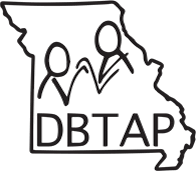Missouri DeafBlind Project
 The Missouri DeafBlind Project strives to improve services and results to youth who are deafblind and their families by strengthening collaborations among local, state, and national teams, provide consultations, and professional development through individual schools or through weeklong trainings at Missouri School for the Blind. These efforts increase early identification and intervention, increase access to communication and the general education environments, facilitate family engagement, support successful transitions, and increase the number of highly-qualified personnel. Technical assistance, training, support, and resources are available for families and service providers of individuals with vision and hearing differences (birth through 21 years of age) at no cost.
The Missouri DeafBlind Project strives to improve services and results to youth who are deafblind and their families by strengthening collaborations among local, state, and national teams, provide consultations, and professional development through individual schools or through weeklong trainings at Missouri School for the Blind. These efforts increase early identification and intervention, increase access to communication and the general education environments, facilitate family engagement, support successful transitions, and increase the number of highly-qualified personnel. Technical assistance, training, support, and resources are available for families and service providers of individuals with vision and hearing differences (birth through 21 years of age) at no cost.
- What is the Missouri DeafBlind Project?PDF Document
- DeafBlind Assistance Request form
- Missouri DeafBlind Census Reporting Form
- Release of Information for DeafBlind Census
- Update Contact Info Form
- Infants and Toddlers AssistancePDF Document
- None to Report form
Quick Links for Census and Requests
Like the Outreach Facebook Page for information about events and more!
Upcoming Events:
.jpg) Hand In Hand: Understanding Deafblindness
Hand In Hand: Understanding Deafblindness
Registration Now Open!
Ready to Register? Click here for Hand in Hand Registration
NEW LOCATION! Kansas City, MO
Dates: October 20-24, 2025
Location: Children's Center for the Visually Impaired (CCVI)
Kansas City,MO
This course provides instructional strategies and practices specific to the education of students with combined vision and hearing loss with or without additional disabilities. The course is taught by specialists in the field of DeafBlindness and contains two sessions. Session one, includes information on such topics as common causes of DeafBlindness, assessments specific to students with DeafBlindness, and instructional strategies shown to be most impactful for this population of learners. Session two, dives deep into the communication needs of learners with DeafBlindness and the specific application of materials from part one for the individual students being served by participants. Follow-up coaching and mentoring is available from MoDBTAP Project staff to deepen comfort levels with real-world application.
The target audience for this course includes any members of the educational team serving a student with combined vision and hearing loss inclusive of those with multiple disabilities. We welcome all teachers (general or special ed.), the learner’s caregivers/parents, paraprofessionals, related service providers, or post-secondary students intending to work with learners with combined vision and hearing differences.
Midwest Transition Institute 2025
Stay tuned for details
The Midwest Transition Institute returns Summer of 2025. More details coming soon!
Who can participate? Any young adult who is DeafBlind, age 16 through 22. Candidates will be language users (with or without devices), able to engage in group activities for at least 30 minutes at a time, and able to stay overnight in a dorm-type setting.
What is the purpose of the Institute? Young adults who are DeafBlind will make progress toward their self-identified transition priorities by completing sections of a transition portfolio, interacting with other young adults and DeafBlind adult mentors from across the Midwest, and learning transition skills related to their life plans in a fun environment. Parents and guardians will learn together about life after graduation and how to plan ahead.
Contact MoDBTAP:
314-633-1587
Ashley Foley
What is an Intervener?
Knowing whether your child would benefit from the support of an intervener is a burning question for many families. Let’s start with the basics. An intervener is a person who works consistently one-to-one with an individual who is deafblind to help them gather information, develop and use communication skills, and establish relationships. The need for an intervener is typically determined during the development of a child or youth’s individualized education program (IEP). In school settings, they work under the supervision of a classroom teacher or other person responsible for implementing the IEP.
For more info on Intervener Certification, see our Professional Development Listing here
For Intervener training/OHOA through MoDBTAP, Contact:
Dena Molen
314-633-1553
DeafBlind Census
DeafBlind Census Reporting Flow ChartPDF Document
DeafBlind Census Reporting Form
Parent Guardian Release of Information
No Longer Enrolled/None To Report
Divulgación de información por parte de los padresPDF Document
More Information:
Importance of the DeafBlind Census PDF Document
OSEP Dear Colleague Letter on DB CensusPDF Document
Frequently Asked Census QuestionsPDF Document
Eligibility Chart: Combinations of Vision and Hearing LossPDF Document
Cuadro de Elegibilidad: Combinación de Pérdida Auditiva y VisualPDF Document
¿Qué es el Proyecto de asistencia técnica de Missouri para sordociegos?PDF Document
ASL Transliteration Videos
DeafBlindness Overview
FAQs MO DeafBlind Census
Parent Release of Information for the MO DeafBlind Census
Family Funding for MoDBTAP
Are you serving a student with deafblindness?
Family/Service Provider Resource Links
- Family Funding ApplicationPDF Document
- Solicitud de Fondo de Familia
The Missouri DeafBlind Technical Assistance Project (MoDBTAP) is excited to offer financial support to families of children with deafblindness. MoDBTAP will provide financial assistance for family members of infants, children and youth (ages birth through 21) who are deafblind to further their knowledge and understanding of their child’s disability and/or the programs and services that support their child, through the Family Involvement Fund. The financial assistance provided should be used to attend conferences and workshops (e.g. registration fees, lodging, travel), as well as to participate in online trainings and webinars or other agreed-upon opportunities.
